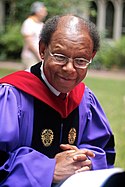James H. Cone Quote
Unfortunately, during the course of 2,000 years of Christian history, this symbol of salvation has been detached from any reference to the ongoing suffering and oppression of human beings—those whom Ignacio Ellacuría, the Salvadoran martyr, called the crucified peoples of history. The cross has been transformed into a harmless, non-offensive ornament that Christians wear around their necks. Rather than reminding us of the cost of discipleship, it has become a form of cheap grace,[3] an easy way to salvation that doesn’t force us to confront the power of Christ’s message and mission. Until we can see the cross and the lynching tree together, until we can identify Christ with a recrucified black body hanging from a lynching tree, there can be no genuine understanding of Christian identity in America, and no deliverance from the brutal legacy of slavery and white supremacy.
Unfortunately, during the course of 2,000 years of Christian history, this symbol of salvation has been detached from any reference to the ongoing suffering and oppression of human beings—those whom Ignacio Ellacuría, the Salvadoran martyr, called the crucified peoples of history. The cross has been transformed into a harmless, non-offensive ornament that Christians wear around their necks. Rather than reminding us of the cost of discipleship, it has become a form of cheap grace,[3] an easy way to salvation that doesn’t force us to confront the power of Christ’s message and mission. Until we can see the cross and the lynching tree together, until we can identify Christ with a recrucified black body hanging from a lynching tree, there can be no genuine understanding of Christian identity in America, and no deliverance from the brutal legacy of slavery and white supremacy.
Related Quotes
About James H. Cone
Cone's work was influential from the time of the book's publication and his work remains so today. His work has been both used and critiqued inside and outside the African-American theological community. He was the Charles Augustus Briggs Distinguished Professor of Systematic Theology at Columbia University-affiliated Union Theological Seminary until his death.
